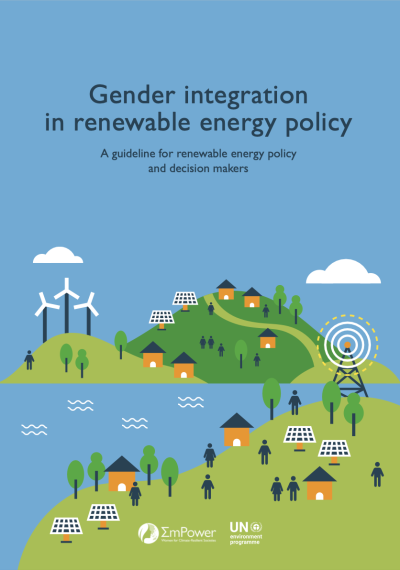
- Report year:2024
- Organisation: UN WOMEN
The purpose of this guide is to introduce and improve the integration of gender issues in renewable energy policies, plans and strategies by providing practical ways to step up commitments in renewable energy policy in an inclusive and gender responsive way.
This guide is for energy policy and decision makers in order to:
- Understand the linkages between gender equality and renewable energy
- Learn some steps on how to integrate gender into regional, national or sub-national renewable energy policies, plans and strategies
- Learn how to address the lack of women’s participation in decision-making in the energy sector
Although this guide is specifically focused on gender integration in renewable energy, the overall approach and framework can be applied to the broader energy sector. It is also advised that the guideline should be used in the Nationally Determined Contributions (NDCs) implementation roadmap that focuses specifically on renewable energy.
The guide is developed under the project EmPower: Women for Climate Resilient Societies of UNEP and UN Women, funded by the Swedish International Development Cooperation Agency (Sida) that among other things supports women entrepreneurs in renewable energy in Bangladesh, Cambodia and Viet Nam by combining actions on policy (gender responsive energy policies, provincial action plans, approach papers), on-the-ground pilot projects (capacity building and access to financial instruments), and sharing knowledge locally, nationally and regionally.
This guide is for energy policy and decision makers in order to:
- Understand the linkages between gender equality and renewable energy
- Learn some steps on how to integrate gender into regional, national or sub-national renewable energy policies, plans and strategies
- Learn how to address the lack of women’s participation in decision-making in the energy sector
Although this guide is specifically focused on gender integration in renewable energy, the overall approach and framework can be applied to the broader energy sector. It is also advised that the guideline should be used in the Nationally Determined Contributions (NDCs) implementation roadmap that focuses specifically on renewable energy.
The guide is developed under the project EmPower: Women for Climate Resilient Societies of UNEP and UN Women, funded by the Swedish International Development Cooperation Agency (Sida) that among other things supports women entrepreneurs in renewable energy in Bangladesh, Cambodia and Viet Nam by combining actions on policy (gender responsive energy policies, provincial action plans, approach papers), on-the-ground pilot projects (capacity building and access to financial instruments), and sharing knowledge locally, nationally and regionally.
